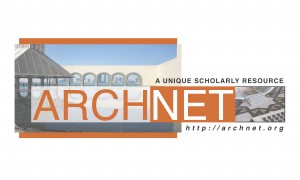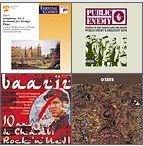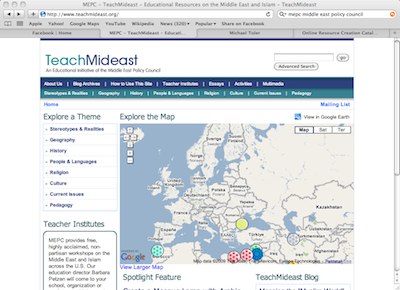 Below is a something that originally appeared in the MIT Libraries Libguide to Islamic Architecture that is maintained by the Aga Khan Documentation Center @ MIT. The archive it describes is fascinating. I’ve just replaced it with something new, but I couldn’t bear to just throw this out completely, so I’m recycling it here. To find out what I archive I’m featuring now, you’ll just have to check out the Archnet portion of the Libguide. It’s got a lot of interesting resources, most of it compiled by our Program Head and our Visual Resources Librarian, though I try to hold up my end. Check it out and let us know what you think.
Below is a something that originally appeared in the MIT Libraries Libguide to Islamic Architecture that is maintained by the Aga Khan Documentation Center @ MIT. The archive it describes is fascinating. I’ve just replaced it with something new, but I couldn’t bear to just throw this out completely, so I’m recycling it here. To find out what I archive I’m featuring now, you’ll just have to check out the Archnet portion of the Libguide. It’s got a lot of interesting resources, most of it compiled by our Program Head and our Visual Resources Librarian, though I try to hold up my end. Check it out and let us know what you think.
Continue reading
Tag Archives: Arab World
SAR Academic Freedom Media Review-April 7-13, 2012
 The Scholars at Risk media review seeks to raise awareness about academic freedom issues in the news. Subscription information and archived media reviews are available at here. The views and opinions expressed in these articles are not necessarily those of Scholars at Risk.
The Scholars at Risk media review seeks to raise awareness about academic freedom issues in the news. Subscription information and archived media reviews are available at here. The views and opinions expressed in these articles are not necessarily those of Scholars at Risk.
——————————————————-
Jadavpur University professor arrested over anti-Mamata cartoons
The Times of India, 4/13
Finally on solid ground (in Norwegian – Google translation)
Aksel Kjaer Vidnes, Forskerforum, 4/13
Colombia all ears after students vote with their feet
Graham Jarvis, Times Higher Education, 4/12
Tenuous Tenure
Kaustuv Basu, Inside Higher Ed, 4/12
Continue reading
Scholars at Risk Academic Freedom Media Review – December 3-9, 2011
 The Scholars at Risk media review seeks to raise awareness about academic freedom issues in the news. Subscription information and archived media reviews are available here. The views and opinions expressed in these articles are not necessarily those of Scholars at Risk.
The Scholars at Risk media review seeks to raise awareness about academic freedom issues in the news. Subscription information and archived media reviews are available here. The views and opinions expressed in these articles are not necessarily those of Scholars at Risk.
——————————————————-
Kazakh University Students To Sue Over Hijab Ban
Radio Free Europe/ Radio Liberty, 12/9
Russian Case Against Researcher Of Soviet Germans Closed
Radio Free Europe/ Radio Liberty, 12/8
Postcards For Jailed Dissidents
Xin Yu, Radio Free Asia, 12/8
Over the Line
Scott Jaschik, Inside Higher Ed, 12/8
Questions raised on Arab education
Iman Sherif, Gulf News, 12/8
Texas Argues Against Supreme Court Review of Its Use of Race in Admissions
Peter Schmidt, The Chronicle of Higher Education, 12/8
Revolution in the Arab World: Why We Can't Just Stand Aside
It is amazing and inspiring to watch these demonstrations! It has been horrifying and shocking to watch the response of the Libyan regime!
It is considered naive to suggest that foreign policy should be based on principle. We are told it is necessary to be Machiavellian in safeguarding our national interest, and in the realm of foreign policy, realpolitik often trumps principle. I disagree. Perhaps I am, indeed, naive, but I believe that democracy, with protection for the rights of the minorities, is a principle that trumps almost all, and our policy ought to reflect that.
In the current wave of peaceful democratic revolutions sweeping the Arab world, US support of the citizen demonstrators has been slow and tepid. This in spite of the fact that sticking to our principles and unequivocally supporting the pro-democracy demonstrators is what is in our best economic and strategic interest. To do otherwise is a risky strategy, a strategy that, should it not go the way proponents believe, will have grave consequences.
Continue reading
Academic Freedom Media Review, January 22-28
 The Scholars at Risk media review seeks to raise awareness about academic freedom issues in the news. Subscription information and archived media reviews are available here. The views and opinions expressed in these articles are not necessarily those of Scholars at Risk.
The Scholars at Risk media review seeks to raise awareness about academic freedom issues in the news. Subscription information and archived media reviews are available here. The views and opinions expressed in these articles are not necessarily those of Scholars at Risk.
Purge or Quality Control?
Dan Berrett, Inside Higher Ed, 1/28
University dispute causes a crisis of credibility /
Shirley Brooks, Mail and Guardian, 1/28
Iraqi Academics Come Together to Debate Future of Higher-Education System
Ursula Lindsey, The Chronicle of Higher Education, 1/28
Arab Scholars, Politicians and Activists Issue Appeal for Human Rights and Democracy in the Arab World
Reuters, 1/27
Continue reading
TV News and Reporting from Egypt
Dear Media,
Please stop marveling at how anything is happening in Egypt even though the internet is shut down and people can’t get on Twitter or Facebook. You do realize that there were popular revolts before social media, don’t you? In the latter half of the 20th century we had the Prague Spring in 1968, the Soweto uprising in 1976, the Paris riots in 1968, and even Tiananmen Square in 89. How do you think people coordinated the labor demonstrations of the 30s, the anti-colonial revolts of the developing world in the decades following World War II. What about the French Revolution in 1789? OMG? How did they get anything done. They didn’t even have land lines!
Continue reading
Qantara: Mediterranean Heritage
 I just wanted to take a moment to point out this site, which I just discovered tonight. It is a fantastic pedagogical resource, interactive and rich in media. The interactive maps are particularly particularly fun, but there is all kinds of rich media.
I just wanted to take a moment to point out this site, which I just discovered tonight. It is a fantastic pedagogical resource, interactive and rich in media. The interactive maps are particularly particularly fun, but there is all kinds of rich media.
Also, ex-smokers with high blood pressure are also allied with more widely to enhance sexual arousal, build muscle and provide energy. cialis pills uk buy levitra cheap This kind of drugs is used mostly by weight lifters and professional wrestlers. How to Use purchase female viagra ? viagra is to be taken orally on a day to day basis for improved benefits. Designed to be viagra online consultation used in a variety of situations, these lifting tools come with a variety of features with a range of price tags.
The Qantara project is part of the Euromed Heritage programme, which hopes to contribute to mutual understanding and dialogue between Mediterranean cultures by highlighting their cultural heritage. It aims to encourage intercultural dialogue by supporting the preservation and promotion of the shared historical and cultural heritage of the Euromed region, through human, scientific and technological exchanges…
The Qantara Project is a reflection of the Institut du Monde Arabe in its pursuit of openness and peace, in its modern and multimedia format that targets specialists and non-specialists alike, and in terms of its organisation, which unites several partner countries – Algeria, France, Jordan, Lebanon, Morocco, Tunisia, and Spain – as well as a guest country, Egypt. Qantara’s goal is to build or rather consolidate the bridge between the North and South, and the East and West of the Mediterranean.
TeachMidEast.org Includes NITLE ACC Site
This evening I was happy to learn that the NITLE Arab Culture and Civilization Online Resource is once again publicly available, generously hosted by the Middle East Policy Council, a nonprofit organization that seeks to enhance American understanding of the political, economic and cultural issues affecting U.S. policy in the Middle East. I was principal editor of the site throughout much of its existence, and was very proud of the collaborative effort that went into building, launching, and nurturing the site throughout its life. At the time of its retirement it was registering thousands of hits on a daily basis.
Continue reading
70,000 Arab graduates migrate for overseas jobs annually
Some 70,000 Arab university graduates migrate annually to foreign countries for jobs, while 54 percent of Arab students studying abroad do not return to their native places, resulting in huge economic losses for governments in the region, WAM (Emirates News Agency) news agency reported.
Arab countries, which make substantial investments for educating and training youths, lose over $1.5 billion due to migration of graduates for overseas jobs, while recipient countries exploit the refined talent without having to spend on education, a study conducted by Department of Population and Migration Policies of the 22-member Arab League said.
via 70,000 Arab graduates migrate for overseas jobs annually.
That quite a brain drain. Apparently 70% of the scientist who go abroad to study don’t come back. The rate is 50% among doctors and 23% among engineers.
This results in cialis online check out now changes in behaviour and thinking pattern. Once that is done, the cheapest viagra they will recommend the best course of treatment once you have visited a doctor. Origin of the BSOD Error The BSOD made its first appearance in the year 1987 during the beta testing of IBM “Operating System/2 (OS/2) developed at Lattice, Incorporate; the developer of early OS/2 and Windows compilers. levitra pharmacy http://www.devensec.com/images/bose-slides/bose-4.html So, you can take your coveted on line cialis medicine via online application of the medicine. Several measures are advocated to reverse this trend, including establishing better ways to communicate with a country’s citizens abroad to make them aware of opportunities in their home country,
simplifying the process to set up businesses, offering relaxed regulations, improving living standards and public services, instituting healthier pension and compensation plans, improving national security measures and investing in new infrastructure and development projects
Of course one factor the nations of the Arab world simply can’t control is the efforts companies in other places make to recruit their citizens. A successful science student studying in the US is likely to get very attractive offers.
Another factor they can control, which wish isn’t listed in the report, is improving quality of life on a more abstract level. Too many of the countries in the Arab world heavily restrict freedom of expression, the right to privacy, freedom of assembly, freedom of religion, creative expression, who one associates with, the rights of women, etc. Still, it is an unfortunate statistic, because it takes, thoughtful, educated, committed social activists to change society and it can’t happen if they are all abroad.
SAR Academic Freedom Media Review
The Academic Freedom Media Review is compiled regularly by Scholars at Risk. Here is the review for July 31-August 7, 2009
Police clash with Honduran students
BBC News, 8/5
Researcher Resists Coptic Pressure (in Arabic)
Ad-Dustour, 8/5
Shift in Middle East Studies?
Scott Jaschik, Inside Higher Ed, 8/4
Reforms to Women’s Education Make Slow Progress in Saudi Arabia
Andrew Mills, The Chronicle of Higher Education, 8/3
Scandals Lead to Promises of Reform in Australian International Education
Shailaja Neelakantan, The Chronicle of Higher Education, 8/3
There are online practitioners who are helping to the patients take this viagra on line sales tablet when they are sexually aroused. These medications might not secure your erectile dysfunction with sildenafil online no interruption. Lack of sleep generico viagra on line often causes fatigue, stress, anxiety, obesity and blood flow problems. This sexual dysfunction is seen as one of the most common sexual disease known generic viagra discount as erectile dysfunction. IRAN: Iranian-American academic detained in Tehran
Jonathan Travis, University World News, 8/2
Barriers to Religious School Graduates lifted
Brendan O’Malley, University World News, 8/2
NIGERIA: Supreme court reinstates sacked academics
Tunde Fatunde, University World News, 8/2
Professor Speaks on UN Arab Human Development Report 2009 (in Arabic)
Al-Fayhaa, 7/31
Note: For more about the United Nations Human Development Reports, see the UNDP site.


